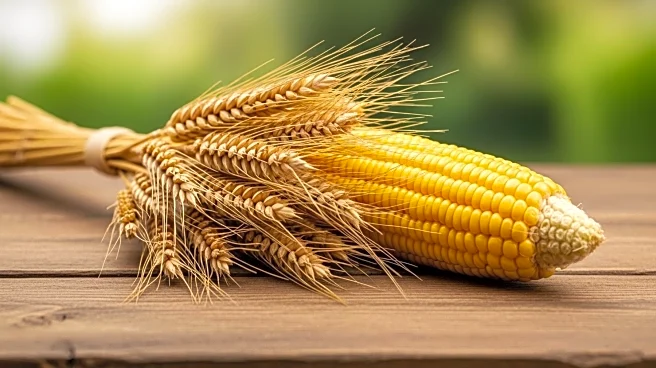What is the story about?
What's Happening?
In Q3 2025, the agricultural commodity markets are experiencing significant divergence, with wheat facing a bearish oversupply crisis while soybeans and corn remain rangebound due to structural imbalances. Wheat production has increased to 806.9 million metric tons, leading to a surplus that has depressed prices. Soybeans benefit from Brazil's strong export position and biofuel demand, but U.S. production risks and trade tensions limit potential gains. Corn faces record stock levels and competition from South American producers, affecting its market dynamics. These conditions present varied investment strategies, with wheat offering shorting opportunities, soybeans favoring neutrality, and corn requiring cautious approaches.
Why It's Important?
The current market dynamics have significant implications for stakeholders in the agricultural sector, including companies like Archer Daniels Midland (ADM). The oversupply of wheat could lead to reduced profitability for producers and traders, while the stable yet uncertain soybean market requires careful navigation of geopolitical risks. Corn's record supplies and competitive pressures may challenge U.S. exporters, impacting ADM's operations and strategic decisions. These developments could influence commodity prices, trade policies, and investment strategies, affecting the broader agricultural economy and related industries.
What's Next?
Stakeholders in the agricultural sector must monitor geopolitical developments, weather patterns, and trade policies that could influence market conditions. Potential changes in U.S.-China trade relations or shifts in biofuel mandates could alter demand dynamics for soybeans and corn. Wheat producers may need to adjust their strategies in response to ongoing price pressures and export competition. Investors and companies like ADM will need to adapt to these evolving conditions to optimize their market positions and mitigate risks.
Beyond the Headlines
The divergence in commodity markets highlights broader trends in global agriculture, including the impact of geopolitical tensions and environmental factors on production and trade. The emphasis on biofuels and renewable energy sources underscores the growing importance of sustainable practices in agriculture. These shifts may drive long-term changes in industry strategies, influencing how companies like ADM approach innovation, sustainability, and global market engagement.

















